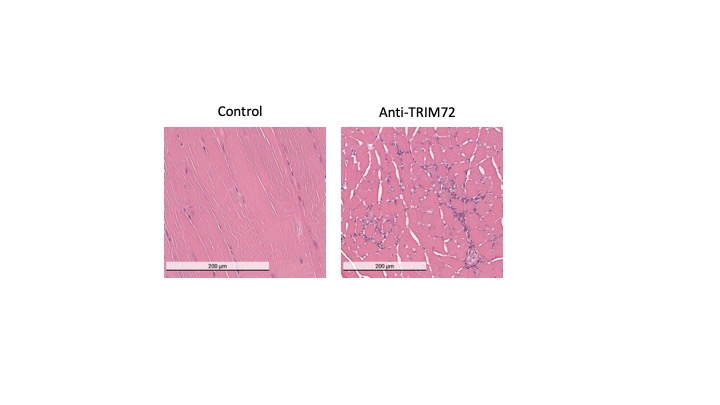Back
Poster Session D
Myopathic rheumatic diseases (polymyositis, dermatomyositis, inclusion body myositis)
Session: (1856–1887) Muscle Biology, Myositis and Myopathies Poster II
1883: Auto-antibodies Targeting Membrane Repair Proteins Enhances Myositis Phenotype
Monday, November 14, 2022
1:00 PM – 3:00 PM Eastern Time
Location: Virtual Poster Hall
- SB
Shane Bruckner, PhD
OSU
Columbus, OH, United States
Abstract Poster Presenter(s)
Shane Bruckner1, Kassidy Banford2, hannah Bulgart2, Kevin mcElhanon3, Rohit Aggarwal4, Chester Oddis5, Noah Weisleder1 and Wael Jarjour1, 1The Ohio State University, Columbus, OH, 2The Ohio State University Wexner Medical Center, Columbus, OH, 3Pfizer Inc., Cambridge, MA, 4Division of Rheumatology and Clinical Immunology, Department of Medicine, University of Pittsburgh, Pittsburgh, PA, 5University of Pittsburgh, Pittsburgh, PA
Background/Purpose: Idiopathic inflammatory myopathies (IIM) are a group of disorders in which autoimmune responses produce a chronic state of inflammation resulting in degeneration of skeletal muscle structure and function. Our previous work generated a robust model of inflammatory myositis by combining a mouse with impaired sarcolemmal membrane repair synaptotagmin VII (SytVII)-/- with a mouse with a regulatory T cell deficiency FoxP3-/Y . The sarcolemmal membrane repair response is a conserved response necessary to restore membrane integrity in myocytes in a variety of muscle diseases. Previous work helped identify TRIM72/MG53 and dysferlin proteins as critical components of the membrane repair process. Our current studies address if antibodies against TRIM72/MG53 contribute to the progression of myositis.
Methods: Levels of antibodies against repair proteins were measured in FoxP3-/Y/SytVII-/-mouse model and dermatomyositis and polymyositis patient serum samples with custom ELISA. Membrane repair function was determined using mechanical glass bead wounding or multi-photon infrared laser microscopy to damage the cell membrane of muscle fibers and live cell imaging to record the entry of fluorescent FM4-64 dye. We also measured membrane integrity in vivo through the use of IgG immunostaining of muscle histology sections. Additionally, we injected exogenous antibodies against membrane repair proteins into myositis mice and determined changes to the myositis phenotype in vivo.
Results: Our results identified novel autoantibodies against membrane repair proteins in IIM patient serum and that exogenous antibodies against these proteins can compromise membrane repair in isolated healthy muscles. Moreover, the injection of antibodies against membrane repair into adoptive transfer myositis mice demonstrated a significant enhancement of the myositis phenotype compared to normal IgG injections. The adoptive transfer of lymph nodes from our FoxP3-/y/SytVII-/- mice into a Rag1-/- mouse background demonstrated that sarcolemmal repair is significantly compromised in distal skeletal muscle in the absence of inflammation, suggesting that these antibodies are sufficient to compromise membrane repair. Additional studies show that IIM patient serum with a high titer of TRIM72 antibodies can also compromise membrane repair in healthy muscle ex vivo.
Conclusion: These findings represent a novel mechanism in IIM whereby decreased sarcolemma integrity induces a vicious cycle of aberrant antigen presentation that directly contributes to the pathophysiology of idiopathic immune myopathies.
 Anti-TRIM72 Antibodies Enhance Skeletal Muscle Inflammation
Anti-TRIM72 Antibodies Enhance Skeletal Muscle Inflammation
Disclosures: S. Bruckner, None; K. Banford, None; h. Bulgart, None; K. mcElhanon, None; R. Aggarwal, Mallinckrodt, Bristol Myers Squibb, EMD Serono, Pfizer, Octapharma, CSL Behring, Q32, Kezar, AstraZeneca, Alexion, Argenx, Boehringer Ingelheim, Corbus, Janssen, Kyverna, Roivant, AbbVie, Jubilant, Orphazyme, Genentech; C. Oddis, None; N. Weisleder, TRIM-edicine, Myofinity, Casma Therapeutics, Nido Biosciences; W. Jarjour, None.
Background/Purpose: Idiopathic inflammatory myopathies (IIM) are a group of disorders in which autoimmune responses produce a chronic state of inflammation resulting in degeneration of skeletal muscle structure and function. Our previous work generated a robust model of inflammatory myositis by combining a mouse with impaired sarcolemmal membrane repair synaptotagmin VII (SytVII)-/- with a mouse with a regulatory T cell deficiency FoxP3-/Y . The sarcolemmal membrane repair response is a conserved response necessary to restore membrane integrity in myocytes in a variety of muscle diseases. Previous work helped identify TRIM72/MG53 and dysferlin proteins as critical components of the membrane repair process. Our current studies address if antibodies against TRIM72/MG53 contribute to the progression of myositis.
Methods: Levels of antibodies against repair proteins were measured in FoxP3-/Y/SytVII-/-mouse model and dermatomyositis and polymyositis patient serum samples with custom ELISA. Membrane repair function was determined using mechanical glass bead wounding or multi-photon infrared laser microscopy to damage the cell membrane of muscle fibers and live cell imaging to record the entry of fluorescent FM4-64 dye. We also measured membrane integrity in vivo through the use of IgG immunostaining of muscle histology sections. Additionally, we injected exogenous antibodies against membrane repair proteins into myositis mice and determined changes to the myositis phenotype in vivo.
Results: Our results identified novel autoantibodies against membrane repair proteins in IIM patient serum and that exogenous antibodies against these proteins can compromise membrane repair in isolated healthy muscles. Moreover, the injection of antibodies against membrane repair into adoptive transfer myositis mice demonstrated a significant enhancement of the myositis phenotype compared to normal IgG injections. The adoptive transfer of lymph nodes from our FoxP3-/y/SytVII-/- mice into a Rag1-/- mouse background demonstrated that sarcolemmal repair is significantly compromised in distal skeletal muscle in the absence of inflammation, suggesting that these antibodies are sufficient to compromise membrane repair. Additional studies show that IIM patient serum with a high titer of TRIM72 antibodies can also compromise membrane repair in healthy muscle ex vivo.
Conclusion: These findings represent a novel mechanism in IIM whereby decreased sarcolemma integrity induces a vicious cycle of aberrant antigen presentation that directly contributes to the pathophysiology of idiopathic immune myopathies.
 Anti-TRIM72 Antibodies Enhance Skeletal Muscle Inflammation
Anti-TRIM72 Antibodies Enhance Skeletal Muscle InflammationDisclosures: S. Bruckner, None; K. Banford, None; h. Bulgart, None; K. mcElhanon, None; R. Aggarwal, Mallinckrodt, Bristol Myers Squibb, EMD Serono, Pfizer, Octapharma, CSL Behring, Q32, Kezar, AstraZeneca, Alexion, Argenx, Boehringer Ingelheim, Corbus, Janssen, Kyverna, Roivant, AbbVie, Jubilant, Orphazyme, Genentech; C. Oddis, None; N. Weisleder, TRIM-edicine, Myofinity, Casma Therapeutics, Nido Biosciences; W. Jarjour, None.

